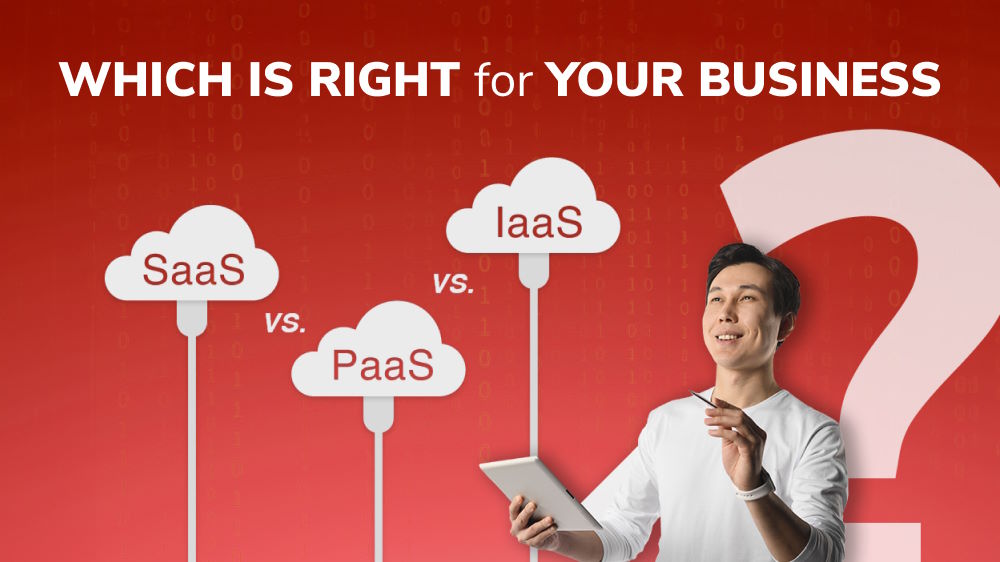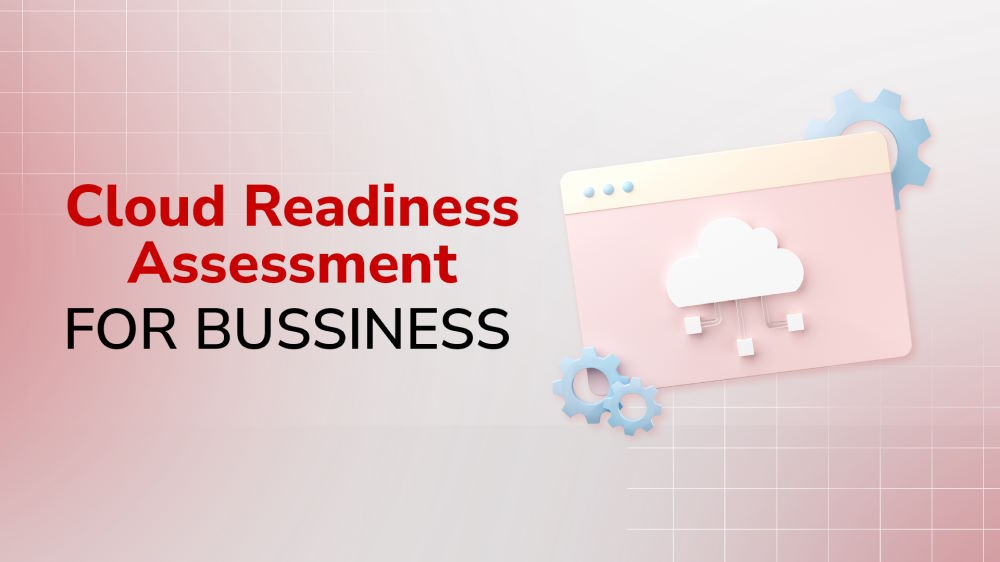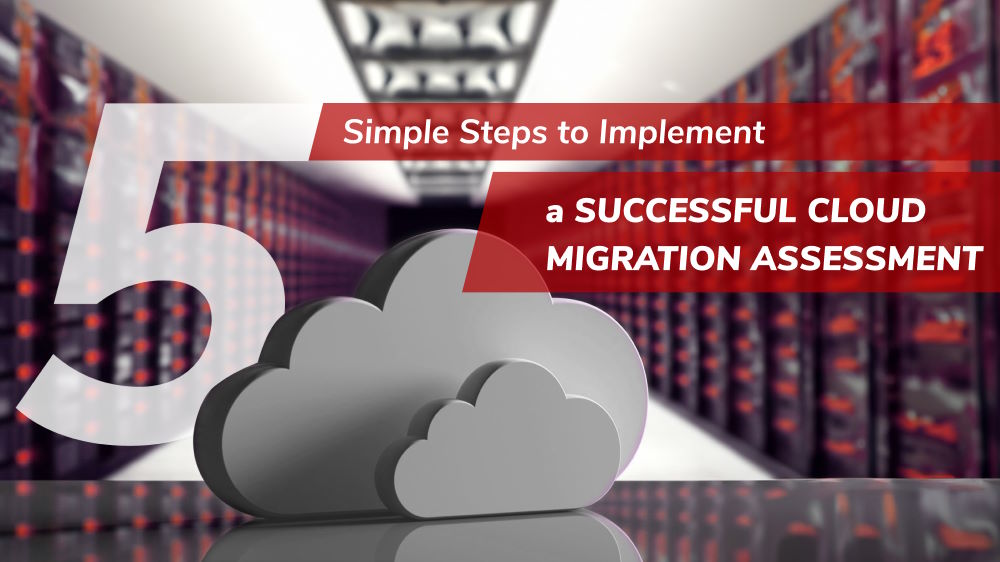
SaaS vs. PaaS vs. IaaS: Which Is Right for Your Business?
Discover the differences between SaaS vs. PaaS vs. IaaS and how to choose the best cloud delivery model for your business.


In recent years, one of the most popular buzzwords in technology has become mainstream, and it is cloud computing. In 2019, 90% of companies were utilizing cloud services, and at the end of 2021, 67% of all infrastructure in enterprises was cloud-based. This means the global cloud market is expanding greatly, and it is forecasted to continue to grow from $545.8 billion (2022) to $1240.9 billion by 2027. This is partially due to the sudden rising demand for cloud solutions and services since the COVID-19 pandemic shut businesses worldwide down and forced them to work online. At first, many businesses have turned to cloud-based models as a way to maintain operations during these difficult times. But then, they discovered the numerous benefits of cloud technology and decided to continue using it in the long run.
Cloud services refer to cloud computing services that enable users to access software, applications, platforms, and other resources easily via the network (the Internet) without the need for local infrastructure or hardware. In short, it is the delivery of computing resources online. Cloud services offer users several advantages, including scalability, pay-per-use billing, high availability, and flexibility in resources since these cloud services are hosted and managed by third-party cloud computing vendors. So, you only have to pay as you go without having to maintain costly onsite infrastructure. There are generally four types of cloud services:
The use of cloud services has been dramatically rising in recent years. According to Cloud Computing Statistics by Cloudward, the total spending on cloud services in 2020 reached $270 billion. This number kept on increasing in 2021 to $332.3 billion (23.1% higher than the previous year), and it was projected to continue to rise in 2022 and beyond. The leading cloud service providers today include Amazon Web Services (AWS), Google Cloud Platform (GCP), Microsoft Azure, and IBM Cloud. Some of the reasons why organizations should work with cloud providers can be explained below:
Since cloud service providers offer flexible and scalable cloud resources, you can easily adjust your resource usage according to your business needs without incurring any additional paid services. For instance, if you need additional data storage for your project, you can easily upgrade your plan at any time. This gives organizations the freedom to adapt and scale their operations as needed without having to worry about server capacity or availability. The convenience of cloud services also leads to the second reason – cost efficiency.
Cloud providers offer highly scalable resources, which can be used to create applications that meet the needs of a growing business. This saves you from having to invest in large, onsite cloud infrastructure and staffing costs. The cost savings can be significant and can greatly outweigh any upfront cloud deployment costs.
Partnering up with a cloud provider, you will receive 24/7 technical support and maintenance services, which you will not be getting if you monitor your own cloud resources. When there are issues, such as server uptime, slow network performance, security breaches, etc., you will have them rectified right in time by the cloud service partner.
Additionally, the right cloud service provider not only comes up with the immediate workarounds for your problems but also makes essential upgrades to ensure that issues won’t happen again and your IT infrastructure is up-to-date with the latest technologies and trends.
Therefore, businesses that are embarking on the cloud journey will not have to invest extra time and resources in cloud maintenance while still getting proactive support if they have the right cloud solutions and vendors in tow.
One of the core benefits of using cloud services is improved data backup and disaster recovery capabilities. With cloud backup and disaster recovery solutions, organizations can easily copy and store their critical data off-site on remote servers. This way, if there is a major disaster that destroys on-premises data centers, businesses can quickly and easily retrieve their data from the cloud and continue operations with little to no downtime.
As always, security is a top concern for businesses, especially when it comes to storing and sharing sensitive data in the cloud. However, by working with a reputable cloud service provider, you can rest assured that your data will be well-protected. Cloud providers invest heavily in security technologies and procedures to ensure that their data centers are secure and compliant with industry standards. In addition, they offer a variety of security features, such as data encryption, two-factor authentication, and user activity monitoring, that can further safeguard your data.

Now that we know the advantages of working with cloud service providers, it’s time to choose the best cloud provider for your business. Although there is a myriad of cloud service providers available out there, choosing the right cloud provider is not an easy task. Since different vendors provide different services, some offer more robust and comprehensive solutions than others, not to mention the level of quality. When assessing cloud service providers, you’d better take these factors into consideration to precisely evaluate them and decide which one to work with.
As stated above, security is a primary concern for businesses when it comes to storing data in the cloud. Therefore, you should assess the cloud security features and practices of each cloud service provider to see if they can meet your organization’s security requirements. In addition, you should also check their compliance with industry standards, such as ISO 27001.
Cloud services are usually billed on a pay-as-you-go basis, which means you only need to pay for the resources you use. However, different cloud service providers have different pricing models and charges, so your duty is to compare their prices before making a decision. In addition, you should also consider other factors that may affect the price, such as cloud storage architectures, bandwidth, and support & maintenance services.
When hiring cloud services, you should also take the user experience into account. Above all, you will not want your employees to waste time trying to figure out how to use cloud computing platforms or applications. Therefore, you need to make sure that the cloud service provider can offer an intuitive and user-friendly interface.
As we mentioned, different cloud service providers will offer different features and functionalities. When choosing the right cloud provider, you first need to assess your business needs and then select the one that can offer the features and functions you require. A useful tip is to list down all the features you need and then shortlist a few cloud service providers based on that.
No matter how good a cloud service provider is, problems and issues are inevitable. When something goes wrong, you will want to get in touch with the customer support team as soon as possible to get the timely assistance.
Thus, customer service and technical support are also important factors to consider when selecting a cloud service provider. Certainly, customer support is included as a must when you hire any service, but the quality of customer service offered by cloud service providers can vary greatly.
A good way to evaluate the quality of customer support of a cloud provider is to check the reviews about their services or contact the customer support team to test how responsive they are.
Another critical factor you should consider is whether the cloud service provider can offer assistance with the implementation and migration process. The last thing you may want is to end up with a platform that is too difficult to set up or migrate to. Therefore, it’s advisable to choose a cloud provider that can offer professional services to help you with the entire process.
Setting up a cloud environment is not a one-time task. You will need to update and upgrade your system from time to time to keep up with the latest trends and technologies. Thus, you should check the release cycle of the cloud service provider since it will directly impact the stability of your cloud system. A cloud provider with a long release cycle is usually more stable, but it may not always be able to offer the latest features and functions.
Vendor lock-in is the term referring to the circumstance when you are unable to make the transition easily from one service provider to another. Vendor lock-in is often caused by contract constraints, bespoken services, and proprietary technologies you order from the cloud service provider.
Since you become dependent on the vendor, it is difficult and costly to switch to other providers. Therefore, businesses should consider using services that do not limit their portability in data migration and vendor transition.
Moreover, you should prepare some kind of exit plan in order not to be stuck with the providers that may no longer meet your needs in the long run. You should choose a cloud service vendor that can offer an easy way to migrate your data and applications to other cloud platforms. In some cases, having more than one provider is also a good idea; this will give you better agility to make changes as needed.
In this article, we have shown you how to choose a cloud provider that best serves your business needs by outlining some of the most critical factors to assess a vendor. Now that you have what you need to build a cloud strategy for your business, select the best provider and avoid the vendor lock-in trap, it’s time to put your plan into action.
Discover the differences between SaaS vs. PaaS vs. IaaS and how to choose the best cloud delivery model for your business.
In this article, we discuss what Git, GitHub, and GitLab are and the features and benefits of each service.
A cloud readiness assessment can help you determine if your business is ready to take advantage of the benefits of the cloud.
Don’t think about adopting the cloud before performing a comprehensive cloud migration assessment. Check out this article for instructions and benefits.
Discover the best cloud certifications in high demand and understand why they are essential for career growth.



